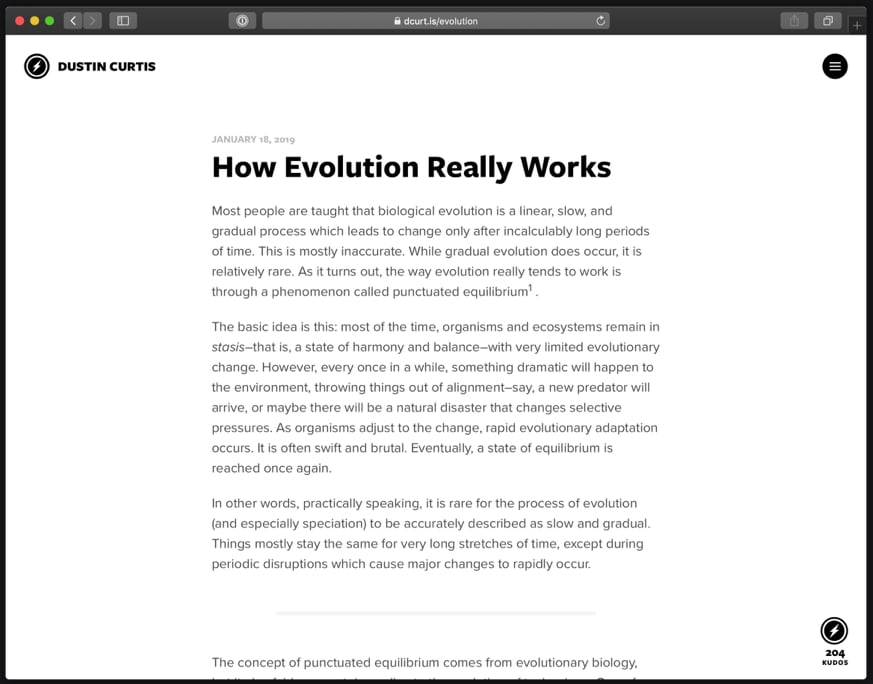Minimalist Blogging Platforms for the Confused

Every blogging option sucks, except the one that makes sense for you.
Are you interested in starting a blog but unsure of the platform to build it on?
Or are you like me, a contented blogger who gets a sudden urge to change your site's theme? As if that will help us write.
I keep looking for a blogging platform to call home.
One reason might be the allure of a new shiny thing or the search for an elusive feature.
I could be searching for a simple platform with essential features. Anything to avoid the WordPress backend.
I had thought it was me who got the urge to move blogging platforms until I read Marius Masalar's post.
Yay.
There are others like me.
I was an infrequent blogger between 2014 and 2017 before becoming despondent. I stopped writing because I lost my purpose and self-belief.
Was writing helping me or anyone?
But I missed writing.
Writing is creativity and self-expression.
Writing is thinking.
And thinking is the way we grow, improve our understanding of the world and one way to help others.
Publishing is a vital piece of the process and it is difficult to find the ideal solution among the various blogging platforms on offer.
Blogging Platforms: My Essentials
Here's my shortlist of essential characteristics a blogging platform needs to offer.
- Evidence of longevity - Nobody wants to put effort and energy into building a presence on a platform that has no long-term plan for growth. While any platform could vanish tomorrow, those dependent on one or two individual developers are a risk.
- Value for money - VFM is challenging to gauge. My approach is to compare providers. What does an annual subscription of £70 provide compared to one costing £200? How many bells and whistles do I need or want, and do the costs reflect my needs?
- No coding skills required - Despite my ambition to learn web development, I want to avoid hundreds of hours making minor tweaks to my blog's theme. I can copy and paste code and make minor tweaks without the blog collapsing but the availability of a user-friendly customisation tool is worth a lot of money by itself.
- Ease of hosting - I enjoy writing, the thinking process, and publishing. I enjoy some of the technical aspects but I want to avoid spending an excessive amount of time playing with servers, transferring files over SFTP (whatever that is), and dealing with significant updates.
- Good reviews - Reviews can be fake, and marketing hype can be hard to cut through, but whatever platform you choose, it needs to have engendered a loyal and trusted user-base.
- Exportable - Leaving a platform must be easy. A writer should own their work and retain the right to take that work to another platform.
The Search
My early experience with blogging became a backend management disaster.
I had no clue about the pitfalls of working on WordPress and the minefield of social media marketing that surrounds it.
Like Apple's iPhone and the App Store, WordPress.org has a plugin store, with third parties selling their premium versions off-site. My mistake was to listen to the "How to make money blogging" mantra, which deflected me from writing and publishing. Within months, I had seventeen plugins, a Twitter account, a FaceBook page, and an Aweber sign-up form.
I quit because the experience was awful.
When the writing urge returned, I looked for a straightforward solution. My search through the maze of blogging platforms follows.
Svbtle
Svbtle was launched by Dustin Curtis in 2011 as an invite-only service, before opening to everyone. The blogging platform is the same today as it was in 2014, and that's its strength.
Svbtle, as the name suggests, is minimalist in the extreme, clean and subtle, and I love it. The platform ticks every box on the vitals list and offers a new meaning to longevity. Svbtle's forever promise, with a few conditions, is to keep your content on the web for eternity after you stop subscribing.
With longevity, the platform costs $75 per year and provides a clean and logical writing and publishing platform. The dashboard is "designed to help you curate thoughts and stories, work on them, and publish when you're ready."
There is no nonsense with Svbtle about needing to publish three times a week.

Svbtle offers a few minor customisation options, colours, logo and custom domain. The result is all blogs look similar and load super-fast, with the focus on your message.
There is no commenting on Svbtle. Instead, a Kudos system, a small circle when clicked, gives the writer something similar to a thumbs up 👍.
But I have a problem with Svbtle.
Svbtle appears abandoned.
The welcome site is modern, up to date, and fast, but when I requested an SSL/TLS certificate, nobody replied.
After a few test posts and no timely response from the concierge (email help ticket), I left.
Ironically, after I deleted my account, Dustin responded to my SSL query. He had been busy working on Svbtle v2.0, but I had settled elsewhere. A year on and there's still no sign of version 2.0.
Blogging platform reviews and other blogs on the Svbtle network all date to 2014/15 or earlier. It's a challenge for me to source an active Svbtle-based blog.
My view on Svbtle is simple: it is fantastic, but nobody is at home.
Write.as

Write.as is a blogging platform that draws on some of the strengths of Svbtle.
There is a distraction-free editor that auto-saves your writing, low annual costs for a Pro account and an easy method to upload and amend themes via copy and pasting of CSS.
Custom domains are part of the Pro package.
There is a significant focus on privacy to the extent you can use the platform for free to publish anonymously, within specific guidelines.
At this point, I am finding it a challenge to think of negative points. The platform has a built-in community of readers/bloggers via the Read.as forum but no commenting system. Your backend includes simple statistics to show how many readers your articles attracted.
When you first discover Write.as you might get confused. The platform has a range of products.
- Writefreely is the software that runs Write.as and is open source giving you the option to host on your servers.
- Read.write.as is the blog roll where people can read articles in one place.
- Snap.as is the image hosting service akin to SmugMug.
- Draft.as is a team/collaborative version of Write.as.
- Submit.as is for publications - I think, but it's confusing.
If Svbtle has focus, Write.as is a bit scatter-gun. Image handling can be clunky, with needing Snap.as to host images. But otherwise, Write.as ticks the vitals.
I have Write.as to thank for giving my writing a boost via its #100Daystooffload challenge. Needless to say, I didn't reach 100 and left after a few months.
I left because I had a blog for long-form content and a microblog. Writing across three platforms isn't recommended, and unfortunately, with its confusing array of products, Write.as lost.
Blot.im

Blot.im is an intriguing blogging platform. Its unique selling point is it's a platform without an interface.
Compared to Svbtle, Ghost and others that show off their writing environments, Blot needs you to use your favourite writing tools to create your posts. Blot adds a folder into your Dropbox or GitHub account.
Anything you put in your specified folder gets published. The developer explains how in Blot's video.
The developer promises longevity, and while the platform offers excellent value, Dropbox is another expense to consider should you need more than a 2GB basic account.
Ease of hosting, loyal users, and data ownership are not issues. However, my original decision not to use Blot took account of the following:
- Customisation - Blot offers a few limited templates; however, my overall impression was some coding experience would be required to get the look you want.
- Exportability - While your data is in easy reach on your folders, I was unsure how to migrate a blog, keeping URLs intact, to another platform should I need to.
Blot looks like it has a long life, and the developer publishes the development pathway on the site, to explain where it's heading.
I was impressed with Blot's simplicity and distraction-free approach.
Posthaven

With Posthaven, I never got beyond the landing pages.
Posthaven reminded me of Svbtle. The blogging platform makes a promise to keep your posts on the web forever, even if you stop paying after a year.
Garry Tan and Brett Gibson, two of the co-founders of an earlier blogging platform, Posterous, created Posthaven. Posterous was launched in 2008, acquired by Twitter in 2012 and shut down in 2013.
Thanks Twitter.
The developers' commitment to a forever promise and the Posterous replacement is an attempt to learn from their mistake selling to Twitter.
Unlike Svbtle, I couldn't find a way to explore the writing or posting environment. The theme examples displayed on the main site are old.
To my surprise, if you search "Posthaven blogs" you will find many examples and evidence of people using the service today. I found some posts published within recent days.
Like Svbtle's Kudos system, visitors can upvote posts. I gave a random post a vote as a test.
I am surprised there are active users because Posthaven appears abandoned. I have checked back in 2024 and the site has enjoyed a refresh. Is something happening?
When assessing any platform or software product, I recommend checking out their blog page, FAQs and social media accounts. X (formerly Twitter) is closed to external viewers without an account, so I'm blocked.
Social or blog entries from long ago are a tell-tale sign not much is happening.
And so it is with Posthaven. The occasional Tweet, an undated blog entry that hasn't changed since I first discovered it, and online reviews that mainly originate from pre-2015.
Like Svbtle, I wanted Posthaven to be alive.
Medium

Where do I start with Medium?
I've tried the blogging platform twice, and both times I've left feeling despondent.
Evan Williams, a co-founder of Twitter, created Medium and launched it in 2012 to encourage users to write. For a time, it was a pro-writer, pro-solo blogging platform. Today the platform keeps changing its focus or pivoting.
In 2017 Medium introduced a paywall, charging £5 per month to have unlimited access to stories and facilitating payment to writers via the Medium Partner Programme. Likes became applause, and the focus, in my opinion, shifted towards prominent publications.
Individual writers are best served if they write for Medium's hosted publications.
In its early years, online reviewers often compared Medium to Svbtle and Posthaven, but Medium continues to grow.
Medium is renowned for its clean, minimalist word editor and ease of use. Writers don't need to concern themselves with hosting or any technical issues.
In terms of platform vitals, longevity does not appear to be an issue. The platform offers value for money, and recent changes allow greater customisation. Exporting data is easy too.
Custom domains were a feature, then removed and again recently reinstated.
But my gripes with the platform are numerous.
- The partner programme encourages writers to produce high volume content. I grew tired of the constant volume of banal stories fed to my stream such as:
Be Part of the 1%: Write a Data-Backed eBook That Becomes the Foundation to Make 6-Figures or
I, For One, Am Sick of Looking At Trump's Face, or hundreds of stories like
How I Make $5,000 Online Every Month — Even Though I'm Ordinary.
- Writing on Medium is similar to writing on any social media network. The platform has the final say on your writing, i.e. you are writing on rented ground.
- Exposure of your stories is at the mercy of Medium's algorithm and the number of followers you have. Medium has become a social network first, writing platform second.
- The platform has become dominated by a circle of volume-busting writers such as Tim Denning and Tom Kuegler; nice guys, I've no doubt.
While I enjoyed some viral success courtesy of Hacker Noon and made a little cash for fun, Medium made me focus on chasing views and other stats.
Medium's problem is it has frequent changes and rewards volume.
Silvrback

Silvrback presents itself as a platform for simple minimalist blogging, similar to Svbtle or Medium. But straightaway, the platform reaches out to coders and developers.
Quotes from the home page include, "One of the best blogging platforms for programmers – coders" and "Whatever the label - web developer, programmer, or coder - this will feel like home."
Silvrback doesn't need to do that. The platform could be suitable for a variety of potential users.
Damien Sowers created the Silvrback blogging platform around 2013 but sold it in 2015. I find such a quick change of ownership puzzling, but the platform appears to be receiving care and attention.
In terms of value, after a fourteen-day trial, an annual subscription is $35.
Customisation options are unknown, but themes seem limited and minimalistic with some current user sites on display.
Hosting is taken care of, but it's unclear if custom domains are available and current reviews are hard to find.
Like some others, Silvrback exists, but nobody is putting fire in its belly. Social media and blog posts go without updates, and one wonders how much longer the blogging platform will be around.
Hugo
Out of curiosity, I looked at Hugo. Hugo is an open-source static site generator offering fast site speed and can power clean, minimalist blogs. Hugo, and similar blogging languages, is not a hosted service and is definitely in a coder/developer's comfort zone.
It's unfair to add it to my list, but I looked, didn't understand a word of the quick start guide, and moved swiftly on.
Back to Ghost

In 2014 when I started blogging, I looked at Ghost. Ghost presented itself as a WordPress alternative, with the tag line "Just a blogging platform." The platform had begun to grow into a high-end publishing platform that would give humble writers like me an inferiority complex.
When I returned to writing in early 2020, I threw caution to the wind and signed up for Ghost Pro, the managed hosting service, costing a minimum of £260 a year. Ghost's managed hosting service was the easier option. The more technically minded users can use Ghost's software for free and host it themselves at modest to low cost.
Ghost ticked a few boxes:
- Longevity - Ghost is a non-profit organisation set up by its creator, John O'Nolan. Ghost can't be sold and will continue should O'Nolan get hit by a bus.
- Ease of hosting - Simple if you use Ghost Pro or know what you're doing in the cloud.
- Good reviews - Ghost has a good reputation.
I enjoyed using Ghost Pro, but I had doubts about signing up for a second expensive year. But in early 2021 a new lower pricing tier became available.
In addition to the cost, other downsides include limited theme options compared to WordPress, which require some coding knowledge to customise.
The platform has made a total pivot toward membership sites but I refuse to criticise the change.
With the latest release, Ghost 5.0, the platform offers:
- Enhanced newsletter features
- New themes
- Improved admin area
- Speed boost
Other recent additions include built-in search and comment features following requests from users over the years.
You might think for writers who want a modest blog, Ghost is not interested in you. That could be true.
At the moment, I am not in the target user-base for Ghost but for £9 a month or £100 a year, the platform is perfect for starting small.
Price is a secondary attraction.
The Ghost editor is the prime benefit. The editor is wonderful to use. The administration area is clean, simple, and easy. In reality, the whole Ghost experience is a joy.
Sorry Ghost, you are too bloody good to ignore.
Ghost leaves much of the competition behind.
Conclusion
Around 2011 there was a wave of new platforms promising a unique style of blogging. An array of blogging platforms promised minimalist-style editors, simple publishing and longevity.
But few have flourished, some floundered, and others hang on by their fingernails.
The developers of the quieter platforms need to make some noise about their products to stir up some interest.
I'm looking at you, Svbtle!
But I'll end as I began, with Marius' quote.
The best blogging platform is the one that makes sense for you.
For me, that's Ghost.
Who knows?
One day I could start a newsletter.
One day.
Thanks for reading this far. If you found this story helpful, please consider buying me a coffee. It would mean so much. 😊



